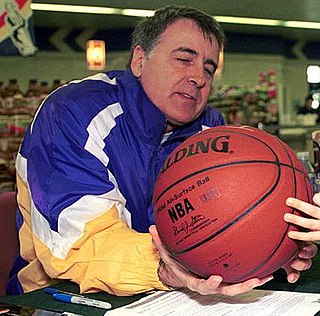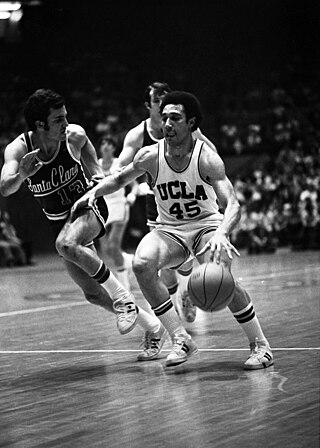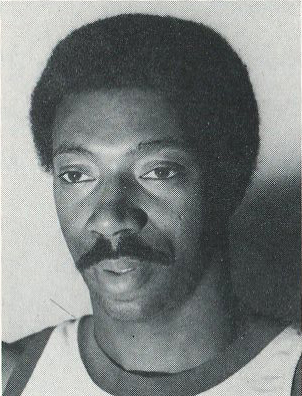
Gail Charles Goodrich Jr. is an American former professional basketball player in the National Basketball Association (NBA). He is best known for scoring a then record 42 points for UCLA in the 1965 NCAA championship game vs. Michigan, and his part in the Los Angeles Lakers' 1971–72 season. During that season the team won a still-record 33 consecutive games, posted what was at the time the best regular season record in NBA history, and also won the franchise's first NBA championship since relocating to Los Angeles. Goodrich was the leading scorer on that team. He is also acclaimed for leading UCLA to its first two national championships under the legendary coach John Wooden, the first in 1963–64 being a perfect 30–0 season when he played with teammate Walt Hazzard. In 1996, 17 years after his retirement from professional basketball, Goodrich was elected to the Naismith Memorial Basketball Hall of Fame. Goodrich is the leader in most minutes played in Suns franchise history with 39.9.

Charles Henry Bibby is an American former professional basketball player who played for the New York Knicks, New Orleans Jazz, Philadelphia 76ers, and San Diego Clippers of the National Basketball Association (NBA). He also spent a season as a player-assistant coach for the Lancaster Lightning of the Continental Basketball Association (CBA).

Elvin Ernest Hayes, nicknamed "The Big E", is an American former professional basketball player and radio analyst for his alma mater Houston Cougars. He is a member of the NBA's 50th and 75th anniversary teams, and an inductee in the Naismith Memorial Basketball Hall of Fame. Known for both his offensive and defensive prowess, Hayes is often regarded as one of the best power forwards in NBA history. Hayes is also known for his longevity, being third all-time in NBA minutes played, and missing only nine games during his 16-season career.
The 1968 NBA draft was the 22nd annual draft of the National Basketball Association (NBA). The draft was held on April 3, 1968, and May 8 and 10, 1968 before the 1968–69 season. In this draft, 14 NBA teams took turns selecting amateur U.S. college basketball players. A player who had finished his four-year college eligibility was eligible for selection. If a player left college early, he would not be eligible for selection until his college class graduated. The first two picks in the draft belonged to the teams that finished last in each division, with the order determined by a coin flip. The San Diego Rockets won the coin flip and were awarded the first overall pick, while the Baltimore Bullets were awarded the second pick. The remaining first-round picks and the subsequent rounds were assigned to teams in reverse order of their win–loss record in the previous season. Six teams that had the best records in previous season were not awarded second round draft picks. Two expansion franchises, the Milwaukee Bucks and the Phoenix Suns, took part in the NBA Draft for the first time and were assigned the seventh and eighth pick in the first round, along with the last two picks of each subsequent round. The St. Louis Hawks relocated to Atlanta and became the Atlanta Hawks prior to the start of the season. The draft consisted of 21 rounds comprising 214 players selected.
Gregory Clinton Foster is an American professional basketball coach and former player who last served as assistant coach for the Indiana Pacers of the National Basketball Association (NBA).
The 1969 NBA draft was the 23rd annual draft of the National Basketball Association (NBA). The draft was held on April 7 and May 7, 1969, before the 1969–70 season. In this draft, fourteen NBA teams took turns selecting amateur U.S. college basketball players. A player who had finished his four-year college eligibility was eligible for selection. If a player left college early, he would not be eligible for selection until his college class graduated.
The 1966 NBA draft was the 20th annual draft of the National Basketball Association (NBA). The draft was held on May 11 and 12, 1966 before the 1966–67 season. In this draft, ten NBA teams took turns selecting amateur U.S. college basketball players. A player who had finished his four-year college eligibility was eligible for selection. If a player left college early, he would not be eligible for selection until his college class graduated. The first two picks in the draft belonged to the teams that finished last in each division, with the order determined by a coin flip. The New York Knicks won the coin flip and were awarded the first overall pick, while the Detroit Pistons were awarded the second pick. This draft was the first to use the coin flip method, which replaced the territorial pick rule. The remaining first-round picks and the subsequent rounds were assigned to teams in reverse order of their win–loss record in the previous season. An expansion franchise, the Chicago Bulls, took part in the NBA Draft for the first time and were assigned the last pick of each round. The draft consisted of 19 rounds comprising 112 players selected.
The 1965 NBA draft was the 19th annual draft of the National Basketball Association (NBA). The draft was held on May 6, 1965, before the 1965–66 season.
The 1964 NBA draft was the 18th annual draft of the National Basketball Association (NBA). The draft was held on May 4, 1964, before the 1964–65 season. In this draft, nine NBA teams took turns selecting amateur U.S. college basketball players. A player who had finished his four-year college eligibility was eligible for selection. If a player left college early, he would not be eligible for selection until his college class graduated. In each round, the teams select in reverse order of their win–loss record in the previous season. Before the draft, a team could forfeit its first-round draft pick and then select any player from within a 50-mile (80 km) radius of its home arena as their territorial pick. The draft consisted of 15 rounds comprising 101 players selected.
Jiří "George" Zídek Jr., is a Czech former professional basketball player who is a sports commentator. He played college basketball in the United States for the UCLA Bruins from 1991 to 1995. He then became the first Czech player ever drafted into the National Basketball Association (NBA), when he was selected by the Charlotte Hornets in the first round of the 1995 NBA draft. He played in the NBA for a total of three seasons and then played professionally in Europe, before retiring in 2006.
Stephen Phil Kuberski is an American former professional basketball player. Kuberski won two NBA titles with the Boston Celtics, in 1974 and 1976 and had a nine-year National Basketball Association (NBA) career. Kuberski was the last Celtic to wear number 33 before Larry Bird.

Thomas Porter Thacker is an American former basketball player. He played in the National Basketball Association (NBA) for the Cincinnati Royals and the Boston Celtics from 1963 to 1968, and from 1968 to 1971, for the American Basketball Association's Indiana Pacers. He is the only player to have played on an NCAA championship team, an ABA championship team, and an NBA championship team.
Donald John May is an American former professional basketball player who played college basketball at Dayton and was twice chosen as consensus second-team All-American (1967–1968). His professional career lasted from 1968 to 1975, and he played for the NBA champion New York Knicks in 1970.
William L. Buntin was an American professional basketball player in the National Basketball Association (NBA). He played college basketball for the Michigan Wolverines. Buntin died of a heart attack at age 26.
George Trapp Jr. was an American professional basketball player.
Carlos C. "Bud" Ogden Jr. is an American former professional basketball player who played in the National Basketball Association (NBA). Although Ogden played for two seasons with the Philadelphia 76ers, he is best remembered for his college career at Santa Clara.
Ralph A. Ogden is a retired American professional basketball player who played in the National Basketball Association (NBA). Ogden played for one season with the San Francisco Warriors. He recorded career totals of 42 points, 32 rebounds and 9 assists.
Edgar Eddie Lacy was an American basketball player who won two NCAA championships for the UCLA Bruins, then played one season in the American Basketball Association with the Los Angeles Stars. In public printed media, his last name was generally rendered as Lacey. However, at the time he signed his professional contract, he indicated the correct spelling had always been Lacy.

Kenneth Washington is an American retired basketball player and coach. As a player, he won two national championships playing college basketball with the UCLA Bruins and represented the United States national team in the 1970 FIBA World Championship. He was also the first head coach in UCLA women's basketball history.

Kenneth Robert Heitz was an American basketball player and attorney. He won three collegiate national championships with the UCLA Bruins from 1967 to 1969, one of the first players in National Collegiate Athletic Association (NCAA) history to do so.





